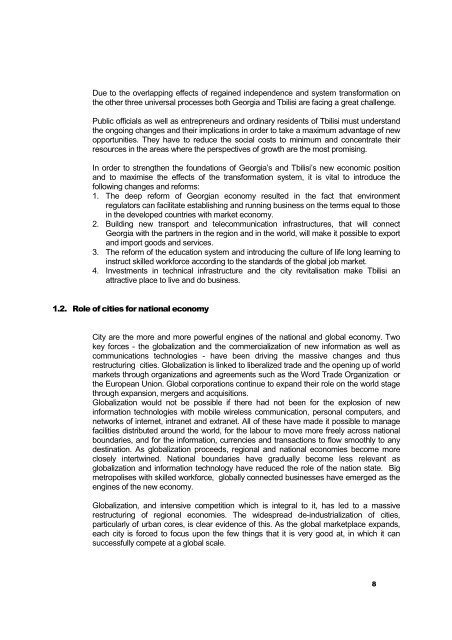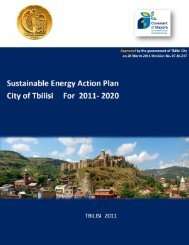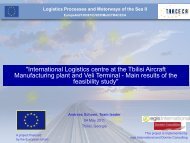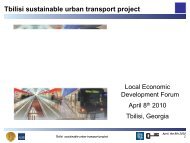LOCAL ECONOMIC DEVELOPMENT PLAN FOR TBILISI ... - LED
LOCAL ECONOMIC DEVELOPMENT PLAN FOR TBILISI ... - LED
LOCAL ECONOMIC DEVELOPMENT PLAN FOR TBILISI ... - LED
Create successful ePaper yourself
Turn your PDF publications into a flip-book with our unique Google optimized e-Paper software.
Due to the overlapping effects of regained independence and system transformation on<br />
the other three universal processes both Georgia and Tbilisi are facing a great challenge.<br />
Public officials as well as entrepreneurs and ordinary residents of Tbilisi must understand<br />
the ongoing changes and their implications in order to take a maximum advantage of new<br />
opportunities. They have to reduce the social costs to minimum and concentrate their<br />
resources in the areas where the perspectives of growth are the most promising.<br />
In order to strengthen the foundations of Georgia’s and Tbilisi’s new economic position<br />
and to maximise the effects of the transformation system, it is vital to introduce the<br />
following changes and reforms:<br />
1. The deep reform of Georgian economy resulted in the fact that environment<br />
regulators can facilitate establishing and running business on the terms equal to those<br />
in the developed countries with market economy.<br />
2. Building new transport and telecommunication infrastructures, that will connect<br />
Georgia with the partners in the region and in the world, will make it possible to export<br />
and import goods and services.<br />
3. The reform of the education system and introducing the culture of life long learning to<br />
instruct skilled workforce according to the standards of the global job market.<br />
4. Investments in technical infrastructure and the city revitalisation make Tbilisi an<br />
attractive place to live and do business.<br />
1.2. Role of cities for national economy<br />
City are the more and more powerful engines of the national and global economy. Two<br />
key forces - the globalization and the commercialization of new information as well as<br />
communications technologies - have been driving the massive changes and thus<br />
restructuring cities. Globalization is linked to liberalized trade and the opening up of world<br />
markets through organizations and agreements such as the Word Trade Organization or<br />
the European Union. Global corporations continue to expand their role on the world stage<br />
through expansion, mergers and acquisitions.<br />
Globalization would not be possible if there had not been for the explosion of new<br />
information technologies with mobile wireless communication, personal computers, and<br />
networks of internet, intranet and extranet. All of these have made it possible to manage<br />
facilities distributed around the world, for the labour to move more freely across national<br />
boundaries, and for the information, currencies and transactions to flow smoothly to any<br />
destination. As globalization proceeds, regional and national economies become more<br />
closely intertwined. National boundaries have gradually become less relevant as<br />
globalization and information technology have reduced the role of the nation state. Big<br />
metropolises with skilled workforce, globally connected businesses have emerged as the<br />
engines of the new economy.<br />
Globalization, and intensive competition which is integral to it, has led to a massive<br />
restructuring of regional economies. The widespread de-industrialization of cities,<br />
particularly of urban cores, is clear evidence of this. As the global marketplace expands,<br />
each city is forced to focus upon the few things that it is very good at, in which it can<br />
successfully compete at a global scale.<br />
8
















